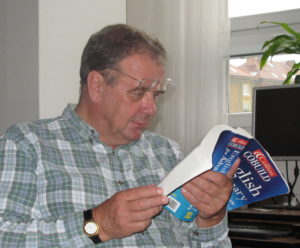Patrick Wyndham Hanks passed away following a long battle with Alzheimer’s and Vascular Dementia on February 1st, 2024. Everyone is invited to contribute to Patrick’s tribute website.

I am a lexicographer, corpus linguist, and onomastician. For ten years (1990–2000) I was chief editor of current English Dictionaries at Oxford University Press. More recently, I have held research posts and taught linguistics and lexicology at undergraduate and postgraduate levels in Britain, America, and the Czech Republic. I am currently a visiting professor at two institutions: the Bristol Centre for Linguistics (BCL, University of the West of England), and the Research Institute of Information and Language Processing (RIILP, University of Wolverhampton). I am a frequent invited plenary speaker at international conferences on lexicography, corpus linguistics, figurative language, and onomastics.
See my full curriculum-vitae.
My main research interests are:
- Corpus analysis of collocations and clause semantics in English
I have developed a procedure called Corpus Pattern Analysis (CPA), which is the foundation of The Pattern Dictionary of English Verbs (https://pdev.org.uk; work in progress). The basic aim is to explore the relationship between word meaning and patterns of word use (words in context). Verb meanings are mapped onto phraseological patterns, rather than just being listed for verbs in isolation. Associated with this is a theory of meaning in language use called The Theory of Norms and Exploitations (TNE), the topic of a book by me that was published by MIT Press in 2013.
This work is associated with an AHRC-funded research project called DVC (Disambiguation of Verbs by Collocation), currently in work at RIILP. This practical work has involved re-evaluating numerous received theoretical assumptions about words and meanings. The Theory of Norms and Exploitations is founded in empirical analysis of large samples of corpus evidence. The fundamental issues addressed by this theory are: 1) the relationship between word meaning and word use; 2) the role of collocations and valency in making meanings; 3) the nature of linguistic creativity.
I am preparing a new grammar of English, explicitly intended to support CPA, for which no existing grammar book is entirely suitable. It offers a straightforward presentation of the categories and generalizations that are needed for tough-minded, empirical analysis of the patterns that motivate modern English usage. The theoretical foundations of this grammar go as far back as Michael Halliday’s seminal 1961 paper, “Categories of the Theory of Grammar”, and John Sinclair’s equally important “Beginning the Study of Lexis” (1966). It draws only eclectically on more recent work in the systemic-functional tradition, and that only insofar as is necessary for accurate language analysis. It explains and exemplifies up-to-date classes of linguistic categories relevant to English, starting with parts of speech. A particular focus is on clause roles (SPOCA). This new grammar, it is hoped, will help to dispel at least two ancient misleading and misguided assumptions: 1) that logic underlies natural language, and 2) that modern languages such as English are really Latin in disguise.
- Figurative language
I am writing a book called Three Types of Semantic Resonance. The three types are: a) Lexical, b) Intertextual, and c) Experiential. The book will contain many examples drawn from corpora and other literature in English. I am also planning a book on Similes and Comparisons.
- Surnames
I am the editor-in-chief of the Oxford Dictionary of Family Names in Britain and Ireland (FaNBI; Oxford University Press, 2016) and the Dictionary of American Family Names (DAFN; Oxford University Press, 2003). I am a lead researcher in the Bristol Centre for Linguistics at the University of the West of England on the AHRC-funded Family Names project. This explores the linguistic and social origins, geographical distribution, and history of family names, using both traditional philological and historical techniques and more recent corpus-derived techniques of analysis.
Contact email: Patrick.Wyndham.Hanks@gmail.com

